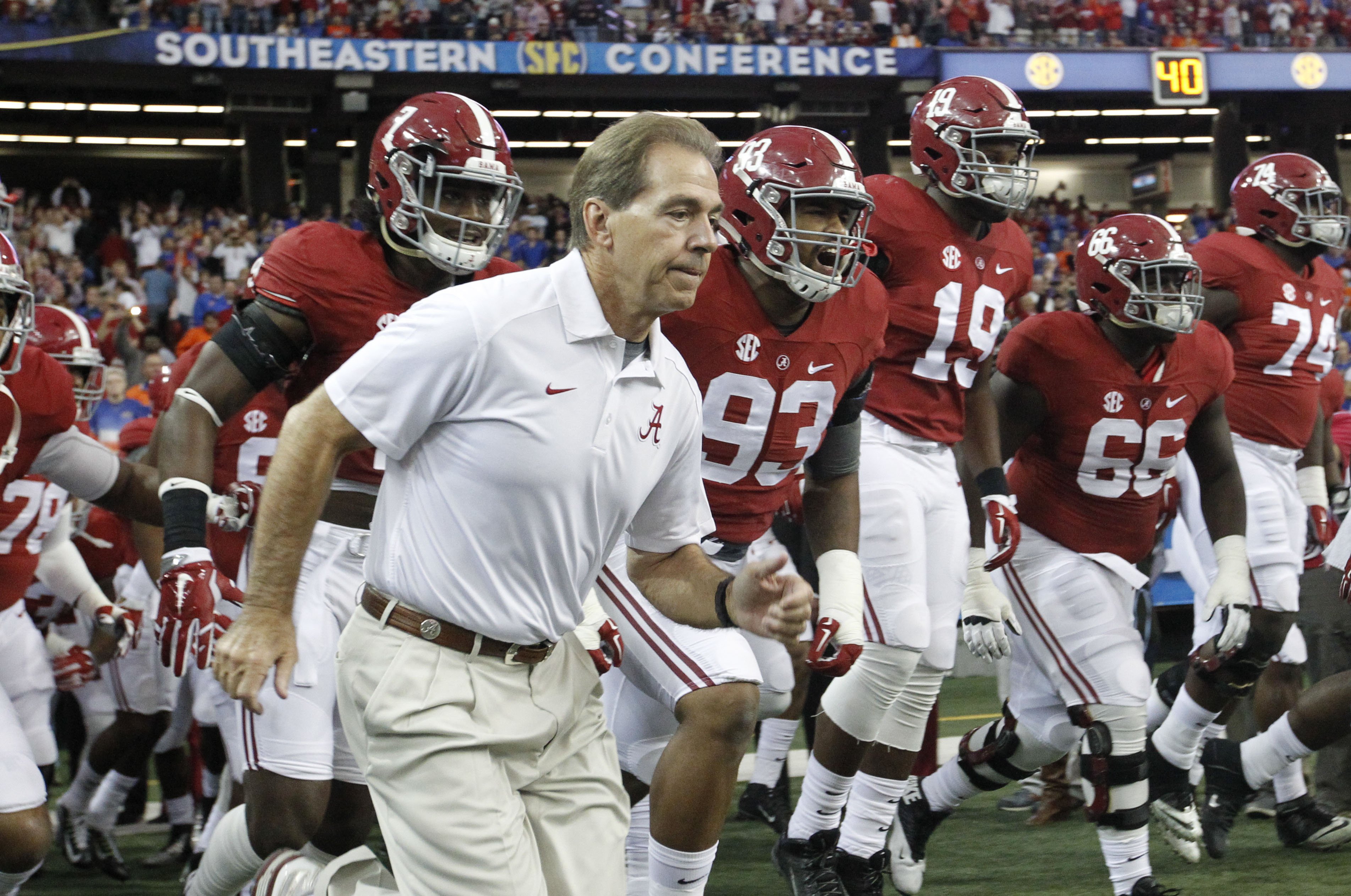TUSCALOOSA, Ala. — Like a lot of others — coaches, Sunday school teachers, your grandparents — Nick Saban has a habit of telling players that nothing good happens after midnight. He’d add that nothing good happens with guns.
The case of Cam Robinson hits two both marks.
The Crimson Tide’s mammoth offensive tackle, a three-year starter, is projected as an early round pick in next year’s NFL draft. He’s also a key cog in Alabama’s plans to continue its dominant run atop college football.
And now, after an arrest last month for possession of marijuana and a stolen firearm — the latter a felony — he’s the latest test case for Saban’s typically lenient policy on second chances.
Along with Alabama defensive back Laurence “Hootie” Jones, Robinson has a court hearing scheduled Thursday in Monroe, La., their hometown. Since their arrests in the early morning hours May 17, there has been no announced disciplinary decision from Saban. He told USA TODAY Sports he had no firm plans regarding Robinson “until the legal system runs its course.”
![Alabama's Cam Robinson charged with possession of stolen firearm [oembed : 85881332] [oembed : 85881332] [oembed : 85881332] [oembed : 85881332] [oembed : 85881332] [oembed : 85881332] [oembed : 85881332] [oembed : 85881332]](/Portals/_default/Skins/PrestoLegacy/CommonCss/images/smartembed.png)
Monroe police arrested Robinson and Jones after spotting their car in a city park at 2:33 a.m. Both Robinson and Jones were charged with misdemeanors for marijuana possession and carrying a weapon in the presence of a controlled substance. Robinson was charged with a felony when a handgun under his seat had been reported stolen in Baldwin County, Ala.
“We do a lot of things internally with our players, which we have implemented with Cam, to try to change behavior in a positive way if we feel there’s issues,” Saban said. “We have never had any issues with Cam before this, so this is kind of an unusual circumstance.
But these are also unusual times, and the arrests have thrown a spotlight on Saban’s typically lenient policy on second chances.
Given the timing, waiting for a legal resolution makes sense. It’s possible the charges could be reduced or even dropped. But if not — fair or not — Saban’s decision on Robinson, and to a lesser extent Jones, will be framed in the context of things elsewhere, including the scandal involving Baylor’s inadequate response to allegations of sexual and physical assault by football players and Mississippi State’s decision to admit five-star defensive lineman Jeffrey Simmons despite a widely circulated video that shows him pummeling a woman on the ground. Those issues and the charges against Robinson and Jones are very different, but comparisons are inevitable.
Saban vigorously defends his practice of giving second chances, saying his goal in discipline is to change behavior and insisting it is more often accomplished within a team structure. Asked if the situation at Baylor had caused him to reevaluate his stance, Saban declined to directly address what has happened in Waco, saying he didn’t know enough about the specifics.
“I think that we all kind of live and learn,” he said. “There’s one thing giving a guy a second chance. That’s completely different than making somebody be responsible for their own self-determination. In other words, they’ve got to be accountable for their actions. There’s two different things here. And you make decisions and determinations about whether you give a second chance as to whether you can trust and believe in them based on their history.”
A year ago, Saban was criticized for accepting defensive lineman Jonathan Taylor, who transferred from Georgia after he’d been dismissed from the team for an arrest on domestic violence charges. Taylor was dismissed by Alabama several months later after he was again arrested on another domestic violence charge (the accuser later recanted her story).
Taylor’s transfer was in part the impetus for the SEC’s “serious misconduct” rule, which prohibited transfers to league schools by players subject to discipline at their previous school in the areas of sexual assault, domestic violence or other sexual violence.
![SEC expands 'serious misconduct' rule for transfer students [oembed : 85886862] [oembed : 85886862] [oembed : 85886862] [oembed : 85886862] [oembed : 85886862] [oembed : 85886862]](/Portals/_default/Skins/PrestoLegacy/CommonCss/images/smartembed.png)
“Look, I’ve been right about that a bunch of times, but I’ve been wrong about it sometimes, too,” Saban said. “And I think we all want to be more careful about that.”
But he insisted the stories of positive outcomes from second chances far outpaced the negative. D.J. Pettway, as one example, was dismissed from school in February 2013 after an arrest for robbery. A year later, he was reinstated. The defensive end became a consistent performer for the Tide and graduated in 3 1/2 years.
“I know you can just look at the glass half-empty,” he said. “But if you ever take a chance at looking at it half-full, there’s a lot more guys that are having success because they got a chance, they got an opportunity, somebody was willing to give them a chance. There’s a lot more of those.
“I just think that the consequences of the bad ones now is catastrophic, so you’ve got to be really, really careful.”
PROJECTING THE 2016 TOP 25
![Projecting the 2016 college football top 25 [gallery : 78659570]](http://www.gannett-cdn.com/-mm-/f5c2d5210263bf10955e125525c28b9db2275773/c=217-0-1684-1254/local/-/media/2016/01/11/USATODAY/USATODAY/635881414819430294-USATSI-8908659.jpg)


![USP NCAA FOOTBALL: SEC CHAMPIONSHIP-FLORIDA VS ALA S FBC USA GA [image : 85880890]](http://www.gannett-cdn.com/media/2016/06/14/USATODAY/USATODAY/636015156712020441-C01-LAST-08-78079424.JPG)
![XXX IMG_USATSI_8526685_1_1_0FBOB2JA.JPG S FBC USA AL [image : 85887096]](http://www.gannett-cdn.com/media/2016/06/14/USATODAY/USATODAY/636015212786267889-XXX-IMG-USATSI-8526685-1-1-0FBOB2JA-75520746.JPG)
